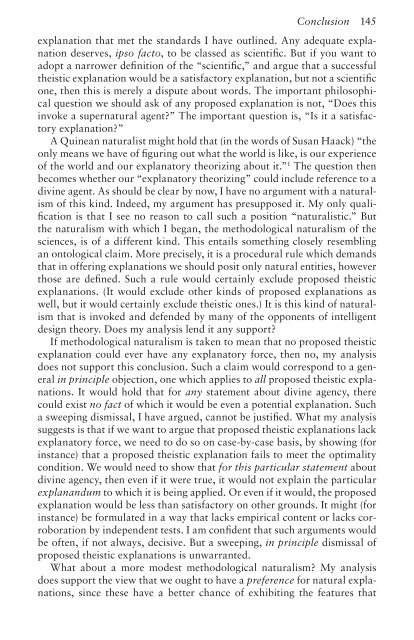Theism and Explanation - Appeared-to-Blogly
Theism and Explanation - Appeared-to-Blogly
Theism and Explanation - Appeared-to-Blogly
You also want an ePaper? Increase the reach of your titles
YUMPU automatically turns print PDFs into web optimized ePapers that Google loves.
Conclusion 145<br />
explanation that met the st<strong>and</strong>ards I have outlined. Any adequate explanation<br />
deserves, ipso fac<strong>to</strong>, <strong>to</strong> be classed as scientifi c. But if you want <strong>to</strong><br />
adopt a narrower defi nition of the “scientifi c,” <strong>and</strong> argue that a successful<br />
theistic explanation would be a satisfac<strong>to</strong>ry explanation, but not a scientifi c<br />
one, then this is merely a dispute about words. The important philosophical<br />
question we should ask of any proposed explanation is not, “Does this<br />
invoke a supernatural agent?” The important question is, “Is it a satisfac<strong>to</strong>ry<br />
explanation?”<br />
A Quinean naturalist might hold that (in the words of Susan Haack) “the<br />
only means we have of fi guring out what the world is like, is our experience<br />
of the world <strong>and</strong> our explana<strong>to</strong>ry theorizing about it.” 1 The question then<br />
becomes whether our “explana<strong>to</strong>ry theorizing” could include reference <strong>to</strong> a<br />
divine agent. As should be clear by now, I have no argument with a naturalism<br />
of this kind. Indeed, my argument has presupposed it. My only qualifi<br />
cation is that I see no reason <strong>to</strong> call such a position “naturalistic.” But<br />
the naturalism with which I began, the methodological naturalism of the<br />
sciences, is of a different kind. This entails something closely resembling<br />
an on<strong>to</strong>logical claim. More precisely, it is a procedural rule which dem<strong>and</strong>s<br />
that in offering explanations we should posit only natural entities, however<br />
those are defi ned. Such a rule would certainly exclude proposed theistic<br />
explanations. (It would exclude other kinds of proposed explanations as<br />
well, but it would certainly exclude theistic ones.) It is this kind of naturalism<br />
that is invoked <strong>and</strong> defended by many of the opponents of intelligent<br />
design theory. Does my analysis lend it any support?<br />
If methodological naturalism is taken <strong>to</strong> mean that no proposed theistic<br />
explanation could ever have any explana<strong>to</strong>ry force, then no, my analysis<br />
does not support this conclusion. Such a claim would correspond <strong>to</strong> a general<br />
in principle objection, one which applies <strong>to</strong> all proposed theistic explanations.<br />
It would hold that for any statement about divine agency, there<br />
could exist no fact of which it would be even a potential explanation. Such<br />
a sweeping dismissal, I have argued, cannot be justifi ed. What my analysis<br />
suggests is that if we want <strong>to</strong> argue that proposed theistic explanations lack<br />
explana<strong>to</strong>ry force, we need <strong>to</strong> do so on case-by-case basis, by showing (for<br />
instance) that a proposed theistic explanation fails <strong>to</strong> meet the optimality<br />
condition. We would need <strong>to</strong> show that for this particular statement about<br />
divine agency, then even if it were true, it would not explain the particular<br />
explan<strong>and</strong>um <strong>to</strong> which it is being applied. Or even if it would, the proposed<br />
explanation would be less than satisfac<strong>to</strong>ry on other grounds. It might (for<br />
instance) be formulated in a way that lacks empirical content or lacks corroboration<br />
by independent tests. I am confi dent that such arguments would<br />
be often, if not always, decisive. But a sweeping, in principle dismissal of<br />
proposed theistic explanations is unwarranted.<br />
What about a more modest methodological naturalism? My analysis<br />
does support the view that we ought <strong>to</strong> have a preference for natural explanations,<br />
since these have a better chance of exhibiting the features that



